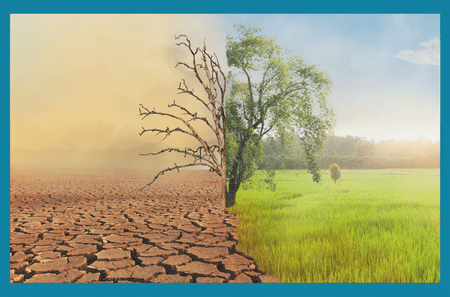The Psychological Impacts of Climate Change on Our Kids – By Kathy Rivera
Climate change has been an enormous challenge for our communities, our country, and our world. Locally, in the last 10 years, we’ve experienced severe flooding, home/property damages and lives lost from Super Storm Sandy. Most recently, the Canadian Wildfires turned our skies along the East Coast to a sickly yellow, bringing alarming air quality alerts. We were confronted by those same daunting instructions we thought were eliminated: remain indoors and wear masks. While natural disasters may seem part of a natural order, they can have long lasting psychological effects on our children.
According to the Center for Disease Control (CDC), the health effects of these disruptions include increased respiratory and cardiovascular disease, injuries and premature deaths related to extreme weather events, changes in the prevalence and geographical distribution of food- and water-borne illnesses and other infectious diseases, and threats to mental health.
The environmental impact of climate change has been attributed to increases in anxiety, depression, social withdrawal, changes in self-esteem and increased aggression levels. These psychological conditions interact with our physical health.
Often, climate change alters residential and natural landscapes, which can create feelings of loss to places that are important. It can alter the perception of being surrounded by a safe and secure environment, surfacing emotions in the form of fear, anger or exhaustion.
As constant exposure to unwanted change in one’s environment continues to occur, an increase in worrying about the future for oneself, our children and community may result. Feelings of helplessness, fatalism and a reduced sense of control over one’s own life can also emerge.
At the Guidance Center, we have seen more illustrations of anxiety and depression in response to climate change. In our younger population, we treat children who refuse to go outside, to school and hide when there is significant rainfall or thunderstorms. In our older adolescent population, there are reported concerns about having children in the future as they do not trust that natural resources will be available.
Luckily, not all individuals and communities will experience climate change in the same way so it’s important to understand where your child’s comfort level sits. Engage in a conversation with your child to determine their level of insight and any emotional responses they may have.
Here are some tips parents can use to support their children to prepare and withstand these impacts.
- Acknowledge their emotions. Help your child name their fears and other emotions, showing empathy which paves the way to teach healthy coping skills.
- Make sure to communicate that being scared, anxious, depressed is a normal response, not something to fight against, ignore, downplay, or suppress.
- Build belief in their own resilience. Have a post disaster plan or household emergency plan that is routinely practiced.
- Assess and strengthen social networks with families, friends, neighbors and other groups.
- Expand everyone’s knowledge on climate change to learn about specific, actionable ideas toward solutions.
- Explore or research a local community project focused on ways to improve the environment.
- Foster optimism by reminding them that people recover and grow after disasters, creating a new world of safety, calm, and hope.
It’s important for caregivers to maintain awareness of climate-related effects on their children. Through constant monitoring, prevention, preparedness, and education on these issues, we will be able to better respond to their psychological needs.
ABOUT:
Kathy Rivera, LCSW
Executive Director/CEO of North Shore Child & Family Guidance Center




